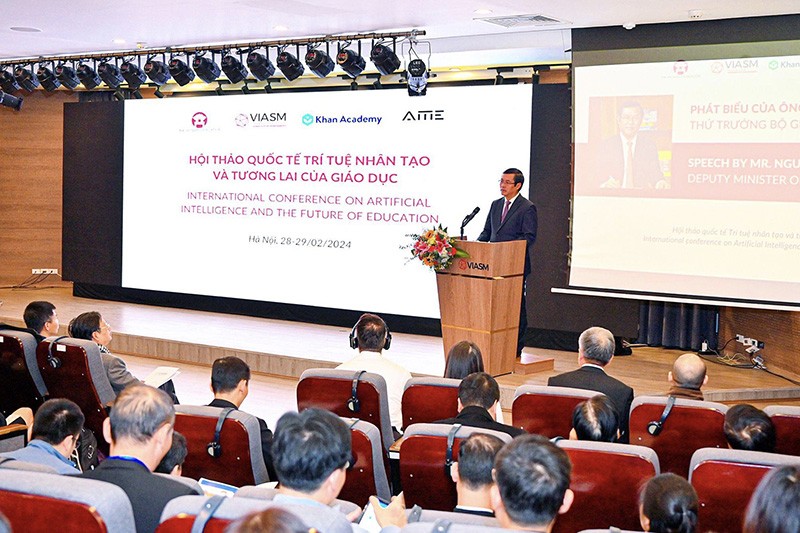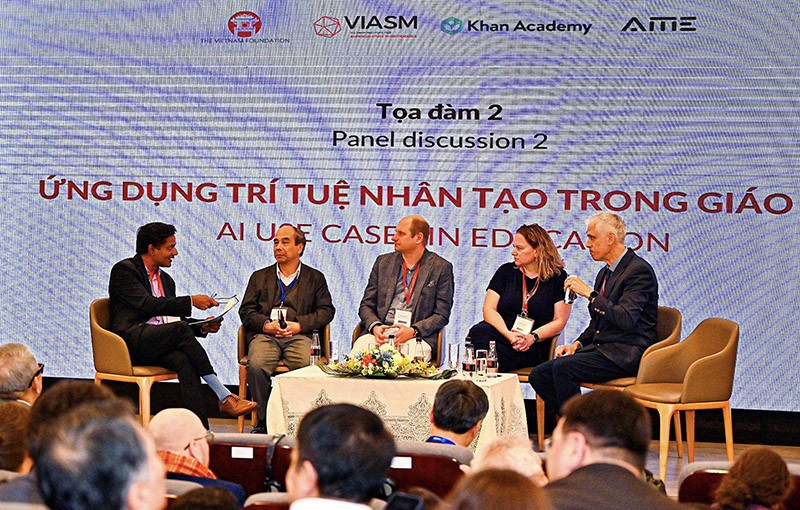
Education experts share Insights into integrating AI in teaching and learning
Latest
The conference was honored to welcome Mr. Nguyen Van Phuc, Deputy Minister of Education and Training; Ms. Melissa Bishop, Deputy Chief of Mission for the U.S. Mission in Vietnam, along with leaders of the Departments and Bureaus of the Ministry of Education and Training, the Ministry of Foreign Affairs, the Ministry of Science and Technology, leaders of higher education institutions, research institutes, leaders of agencies, units, and partners of VNF, VIASM, AME, as well as over 40 speakers and scholars from 17 countries around the world. Notably, the conference also saw the participation of two distinguished guests, Professor Tran Van Nhung, former Deputy Minister of Education and Training, former member of the Science Council of the Vietnam Institute for Advanced Study in Mathematics; and Dr. Nguyen Huu Do, former Deputy Minister of Education and Training.
Artificial intelligence plays a significant role in defining the future of education
Mr. Nguyen Van Phuc, Deputy Minister of Education and Training, asserted, "We are observing incredible advancements in artificial intelligence (AI) lately. As educators, it is imperative to contemplate, comprehend, and undertake essential measures as AI quickly infiltrates education."
 |
| Deputy Minister Nguyen Van Phuc asserts that artificial intelligence plays a significant role in defining the future of education. |
Agreeing with the perspective above, Ms. Melissa Bishop, Deputy Chief of Mission for the U.S. Mission in Vietnam, also praised the capabilities of artificial intelligence across various sectors, including education. The U.S. government has been involved in several projects in Vietnam aimed at advancing AI applications. She also expressed the intention to strengthen cooperation with Vietnam to further harness AI for enhancing education quality and ensuring ethical, equitable, and effective integration.
Following Ms. Bishop's remarks, Assoc. Prof. Dr. Le Minh Ha, Executive Director of the Vietnam Institute for Advanced Study in Mathematics, also shared insights into the potential of artificial intelligence in education. He highlighted a poem by AI to illustrate how artificial intelligence could serve as a companion in our quest for knowledge and in shaping the future. Moreover, he affirmed that the conference is an opportunity to reflect on the achievements and challenges presented by AI, thereby facilitating a dialogue to devise the most beneficial application strategies.
| "We are observing incredible advancements in AI lately. As educators, it is imperative to contemplate, comprehend, and undertake essential measures as AI quickly infiltrates education." Mr. Nguyen Van Phuc, |
Numerous innovative ideas to apply artificial intelligence in teaching and learning
In the ongoing discussion on the application of AI in education, Mr. Sal Khan, the founder of Khan Academy, mentioned the outcomes of Bloom's taxonomy (Six levels of cognitive domain), illustrating a 30% improvement in learning efficiency with individual tutoring. However, the challenge lies in the high cost of hiring private tutors, which is only feasible for some families. Thus, he believed that AI could address this issue. Mr. Sal Khan asserted, "Just like the Internet, Google, it would be irrational to restrict students' access to AI.” During his presentation, Khan also trialed an AI tutoring system, Khanmigo, utilizing the OpenAI framework. Rather than solving problems for students outright, this tool provides hints and relevant information, guiding them toward solutions on their own. Furthermore, it allows teachers and parents to oversee interactions between students and AI, ensuring its use for learning. "I think this is a way for AI to support learning without demotivating students," Khan remarked, expressing plans to adopt this AI tutoring approach widely if trial outcomes are favorable.
Furthermore, Sal Khan highlighted Khanmigo’s functionalities tailored for educators. Teachers can employ Khanmigo for lesson planning, activity creation, and concept introduction. Despite initial worries about AI's potential for facilitating cheating, it has proven to be an invaluable asset for both students and educators.
Continuing the sharing session, focusing on the application of AI in teaching and learning mathematics in Vietnam, Assoc. Prof. Dr. Le Anh Vinh, Chairman of the Vietnam Association for Mathematics Education and the Director of the Vietnam Institute of Educational Sciences, highlighted the obstacles and challenges confronting both students and teachers in Vietnam, notably the scarcity and inferior educational resources. He also identified several AI applications in education, such as the Got It platform, chatGPT, and Khan Academy, underscoring their potential to aid in achieving the objectives of math education, including enhancing analytical and logical reasoning skills and the capability to pose and solve problems. "If students ask questions we cannot answer, they will seek answers from AI. Therefore, I believe that the answers from real people must be better than AI," stated Prof. Dr. Le Anh Vinh. He believed AI would help students solve problems more quickly, foster their love for mathematics, understand the importance of learning mathematics, and develop their cognitive skills. Hence, teachers should prioritize guiding over grading, aiding students in uncovering the essence of the subject matter and fostering a more profound interest in their studies. Furthermore, teachers are perfectly positioned to leverage AI to craft high-quality lectures and swiftly evaluate students.
| Mr. Sal Khan, the founder of Khan Academy, said AI could address the high cost of hiring private tutors, which is only feasible for some families, |
During the panel discussion, local and international experts and scholars discussed the impact of artificial intelligence on the future of education. At the same time, scholars proposed significant solutions to enhance effectiveness and minimize artificial intelligence's negative impacts on education.
Sharing insights into the potential of AI in teaching, Professor Ho Tu Bao, Director of the Data Science Lab at VIASM, noted its capacity to offer personalized learning experiences. This significantly aids teachers in preparing lessons and encourages students to be more self-assured and independent in their learning journey. In the context of the current educational landscape, such AI capabilities could greatly benefit the advancement of Vietnam's education sector.
Mr. Alain Schaeffer, a scholar from Khan Academy International, also agreed with Professor Ho Tu Bao regarding the personalized learning capabilities of AI. He added that artificial intelligence would significantly impact the field of education, specifically helping teachers save 50% of their time and improving overall efficiency.
The conference has gathered numerous perspectives, evaluations, and discussions from speakers and participants, contributing to the effective integration of artificial intelligence and information technology into teaching and learning.
 |
| Speakers share ideas on how to apply AI in education effectively. |
The representative of the organizing committee, Assoc. Prof. Dr. Le Minh Ha affirmed that the in-depth discussions during the conference would serve as a foundation for realizing the potential of artificial intelligence in education in Vietnam. The Vietnam Institute for Advanced Study in Mathematics will continue conducting research and organizing discussion forums to exchange ideas on effective ways of utilizing artificial intelligence in teaching and learning. In alignment with this spirit, Mr. Do Ngoc Minh, a representative of The Vietnam Foundation and co-founder of the Khan Academy Vietnam Program, remarked, "As a non-profit educational organization, The Vietnam Foundation's team always closely collaborates with partners such as the Vietnam Institute for Advanced Study in Mathematics, Khan Academy, the Vietnam Association for Mathematics Education, as well as Departments of Education and Training nationwide to stay updated on the latest and most effective trends in teaching and learning. This, in turn, provides equal learning opportunities for students nationwide and enables educators to quickly access technology to enhance the quality of digital transformation in education."
| TIN LIÊN QUAN | |
| The rise of learning cities: A global phenomenon | |
| Learning solution for businesses in the era of AI | |
| Artificial Intelligence in Education: Understanding AI to utilize effectively | |

















